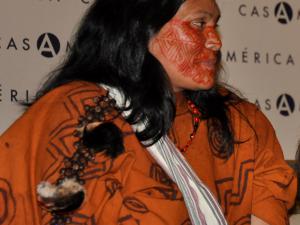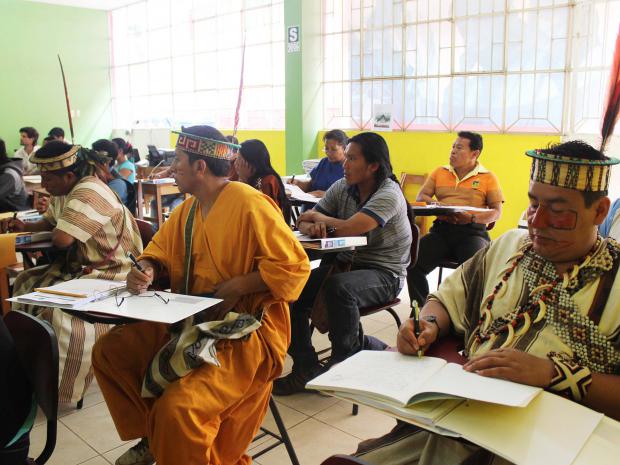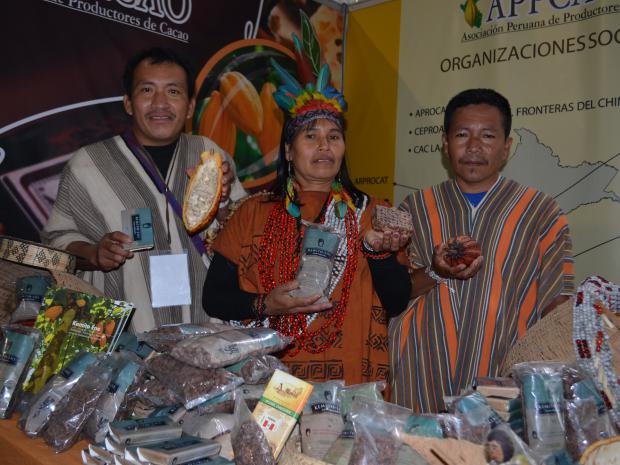Ashaninkas: From Invisible to Protagonist | The Brave Journey of Peruvian Amazonian Indigenous People.
Discussion details

Guided by the idea: "The right to have rights: the human rights and collective rights", Ruth has succeeded to put the demands of the Amazon indigenous people on the national and international agenda.
The Ashaninkas is an indigenous people living in the central part of the Peruvian Amazon, surrounded by silent rivers and fog. They were for a long time invisible to the rest of the world, protected and at the same time marginalized by the magnificent forest. However, in the 1980’s the unnoticed life of the Ashaninkas came to an abrupt end when the armed terrorist group Shining Path settled down by the Ene River and enslaved them for more than a decade. Almost 6,000 Ashaninkas out of a population of 11,000 were killed or starved to death in the camps established by the Shining Path in the middle of the jungle. In spite of this severe impact on their population, the Ashaninkas people managed to organize themselves and leave behind their invisibility and the abuse.
Marked by the violent past and the contemporary feelings of mistrust and prejudice, the Ashaninkas courageously organised themselves in 17 communities headed by the organization “Central de Comunidades del Río Ene” or CARE (www.careashanika.org). In CARE the families join in assemblies to define together the steps towards kametsa asaike (wellbeing), as well as the future of their children.

However, this is not an easy way to make decisions and success depends on the often unlikely coincidence of a common vision, a solid organization and a responsible and brave head of community that can take the lead. Luckily, the Ashaninka have all this. In their assembly in 2005, a young woman, Ruth Buendía Mestoquiari, dared to present herself to lead the organization and against all odds she was elected and became the president of CARE.
Ruth was also one of those girls who had suffered from the violence. After her father was murdered, she had to escape by night, only 11 years old, from one of the Shining Paths’ camps, carrying her ill mother and two younger brothers. Ruth made a small, fragile boat of logs, which she navigated on the rushing waters of the Ene River.At sunrise, they were safe.

Ruth Buendía has demonstrated herself to be prudent, but firm. Guided by the idea: "The right to have rights: the human rights and collective rights", Ruth has succeeded to put the demands of the Amazon indigenous people on the national and international agenda. Due to this, Ruth has had to bear threatens, insults and indifference, but she has never lacked of support neither from the communities nor the people and institutions that have recognized her experience.This is why Ruth always recognises that "all these achievements have only been possible, thanks to the support of my communities and the loyalty and commitment of our allies." So, who are these faithful allies?

One of them is the European Union, through the Alternative Development Program in Satipo - DAS (www.das.org.pe), implemented in the province of Satipo, in the central part of the Peruvian Amazonian basin. As partner of this EU bilateral programme, CARE is implementing two objectives:to promote the cocoa produced by the Ashaninkas and to strengthen other indigenous organizations in the Amazon in good governance.
Before starting the DAS programme, the organic cocoa produced by the Ashaninkas could not be found on the world market. Now, you can hear comments such as "(...) it is amazing. We were told that the Ashaninkas did not know how to work and now our cocoa is sold in other countries! "

"Kemito Ene" (kemito means cacao), the association created by CARE grouping nearly three hundred enthusiastic Ashaninkas families dedicated to cocoa production, has been strengthened through technical assistance and new equipment provided by the DAS programme. The DAS has achieved to combine the traditional protection of the Amazon forest with the demand of high quality cocoa. Today, the cocoa of the Ashaninkas reaches the European chocolatiers.
Furthermore, CARE has designed a training program that allows young indigenous leaders to acquire skills to be able to propose and influence over public policies that concerns them and their communities. Through the DAS programme, the EU has successfully supported this experience in defence of the rights of indigenous peoples to participate and play a role as citizens.
Finally, to end this journey of the Ashaninkas people from living in invisibility to becoming successful protagonists of their lives, we listen to the enthusiastic and emotional words of Ruth Buendía at the ceremony where she received the Goldman Environmental Prize in 2014 for protecting the area in which CARE is located:
"Therefore I speak to you, to remind the world that we are human beings, and that any beautiful word like justice, development and freedom, should be pronounced having us in mind."

EU Project DAS SATIPO
The Alternative Development Program in Satipo – DAS, is a bilateral programme financed by the European Union and the Peruvian Government and implemented in the central parts of the Peruvian Amazon by the National Anti-Drug Agency (DEVIDA). The total amount of the program is 10.4 M euro that contributes to the National Anti-Drug Strategy 2012 – 2016.
The objective of the DAS Program is to contribute to reduce poverty, promote social integration and prevent activities related to the illegal production of coca leaves.
Through a grants mechanism the Program supports organizations of local producers to promote the cultivation of alternative products, such as coffee and cocoa, and has facilitated the access to national and international markets, improving the income levels of the local producers.
The strengthening of local producers is complemented by a program to allocate land titles, so that the local producers are guaranteed the legal right to their lands, benefitting the upcoming generations of agricultural entrepreneurs.
Finally, the Program has strengthened the efficiency of local institutions through training on public administration and good governance.
All activities of the DAS Program are implemented respecting a sustainable management of the natural resources, taking into consideration the demands of the indigenous communities and their organizations.
More information:
DAS SATIPO Project
Calle 1 N°320, Urb. Santa Leonor
Satipo - Junín -PerúTeléfono: (051)064-546450Web: http://das.gob.pe
E-mail: das@devida.gob.pe
Log in with your EU Login account to post or comment on the platform.